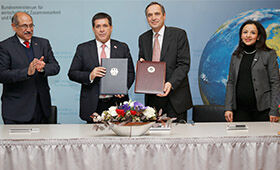Paraguay wishes to introduce dual vocational education and training based on the German model
Paraguay becomes BIBB’s 5th cooperation partner in Latin America
Paraguay has become BIBB’s fifth South American partner country. A project to implement “MoPaDual”, a Paraguayan model of dual training, was officially launched on 8 December 2016 to coincide with the signing of the cooperation agreement. BIBB will provide consultancy services for two years.
The project for the implementation of “MoPaDual” was launched on 8 December 2016. BIBB and the Paraguayan Ministry of Labour, Employment and Social Security (MTESS) signed a cooperation agreement in the presence of President Horacio Cartes. BIBB will advise Paraguay on the establishment of dual vocational education and training over a period of two years.
The main focuses of the consultancy services are as follows:
- Establishment of institutional and structural foundations based on the German model, including organisational development of the Sistema Nacional de Formación y Capacitación (SINAFOCAL)
- Development of company standards
Prior to the signing on 6-7 December, the BIBB working team in Paraguay held a planning workshop with managers from SINAFOCAL and from the Servicio Nacional de Promoción Profesional de Paraguay (SNPP).
For the Paraguayan government, the challenge of modernising the country’s VET system is more urgent than ever as it seeks to make qualified workers available to the labour market in the near future.
According to the Paraguayan Minister of Labour Guillermo Sosa, the aim of MoPaDual is to develop and establish a model of dual training which will be integrated into the whole of Paraguay’s educational system and will gain national recognition. Mr. Sosa went on to say that the plan was for the consultancy services provided by BIBB to adapt the structures and procedures of the Paraguayan vocational education and training system to meet new requirements and to enable VET to be designed to be more market-oriented and in more effective in terms of employment in order to increase the attractiveness of vocational education and training in Paraguay.
The signing of the cooperation agreement took place in Berlin on 8 December 2016. Representing BIBB at the signing ceremony were Deputy President Dr. Reinhold Weiß and Diana Cáceres-Reebs, Project Head for Latin America. Those in attendance from the Paraguayan government were President Horacio Cartes, the Minister of Labour, the Foreign Minister, the Finance Minister and approximately 20 further delegation members.
At the signing, Professor Weiß emphasised that the aspiration in introducing a dual training model was to “meet the demand of Paraguayan trade and industry for well-qualified workers.” An improved qualification level for young people would help to create more employment opportunities and enhance their personal, social and economic situation.
Vocational education and training in Paraguay has previously offered trainees very little in the way of practical experience at companies. At the same time, companies have problems in finding well-qualified skilled workers. Paraguay believes that the solution is to involve companies in vocational education and training and to strengthen cooperation between the state and trade and industry in the planning, implementation, monitoring and financing of VET. In 2016, the Paraguayan Ministry of Labour turned to BIBB in order to work together to develop a Paraguayan model of dual training (MoPaDual) based on the German system.
Vocational education and training in Paraguay
In Paraguay, both the Ministry of Education and the Ministry of Labour are responsible for vocational education and training. The “technical upper secondary school leaving certificate” (Bachillerato Técnico) is governed by the Ministry of Education, which also offers the PRODEPA programme for adult education. Vocational education and training courses are designed by the Ministry of Labour. These programmes largely do not require any specific school qualification for participation. Courses are conducted by SINAFOCAL and SNPP.
The Paraguayan dual training model (MoPaDual)
MoPaDual has been commissioned by the MTESS. The executing bodies are the National System for Initial and Continuing Training (Sistema Nacional de Formación y Capacitación, SINAFOCAL) and the National Service for the Promotion of Vocational Education and Training (Servicio Nacional de Promoción Profesional de Paraguay, SNPP).
Sistema Nacional de Formación y Capacitación (SINAFOCAL) is a body which comes under the auspices of the Ministry for Labour, Employment and Social Security (MTESS). It governs initial and continuing training in Paraguay. SINAFOCAL brings together various private and public sector initial and continuing training institutions, including the SNPP, the country’s largest vocational education and training body.
Its tasks include the following:
- Creation of a “National Catalogue of Occupational Profiles” in conjunction with the Ministry of Education
- Stipulation of standards for the various competencies
- Stipulation of training contents
- Drafting of VET guidelines
- Promoting participation in training programmes by the private sector
- Monitoring VET activities on behalf of the SNPP and other public and private sector institutions
SINAFOCAL was founded as a vocational training body in Paraguay on 26 December 2000 via Law No. 1652.
The Servicio Nacional de Promoción Profesional de Paraguay (SNPP) is also governed by the MTESS. Its main goals are the organisation, funding and development of initial and advanced training programmes. The SNPP is represented right across Paraguay by 62 training centres. Provision encompasses formal and informal training in the agricultural, trade and industry and service sectors. The SNPP was established in the year 1971 by Law No. 1253.

